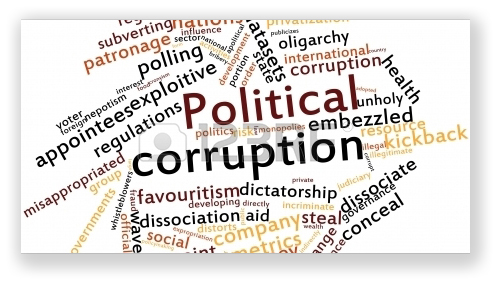We’re still doing a weekly newsletter… we’re just posting pieces of it every day. The news is fresher this way…
HOP ON THE BUS, GUS
John George, Jr., operated a bus system on behalf of Southeast Regional Transit Authority (SRTA), a government-funded regional transit authority. SRTA owns the buses, facilities, and equipment, but it doesn’t operate them. Instead, it contracted with private entities to do that. John’s was a company called Union Street Bus Company (USBC).

John bears some passing resemblance to Bill Clinton. He started out in government, and then left his position as a Massachusetts state representative. He then bought USBC. At the time of the purchase, USBC had a contract to operate the SRTA bus system through 1995. After John took over, USBC’s contract was renewed several times, the last term being 2006 through 2011.
John maneuvered his way into the transit agreement through collusion with a state official who John had hand-picked to replace himself. His crony manipulated the bidding process and when John lost the crucial support of the City of Fall River –because he refused to hire one of the mayor’s cronies – his state official buddy ran interference for him.
Under USBC’s agreement, all of its expenses were paid by SRTA with public funds: the Agreement bound SRTA to pay USBC the difference between USBC’s operating expenses and USBC’s operating income. SRTA also paid USBC a management fee of anywhere between $200,000 and $250,000 a year (from which John paid himself a salary).

John had a sweet deal, but he couldn’t leave well enough alone. He hired his girlfriend to work at the bus line as an administrative assistant, with her $100,000 a year salary paid by SRTA. Instead of keeping regular office hours, she showed up “once or twice a week, if at all.” in the summertime. But she did work – at John’s farm, selling produce for him. John also had a long-time friend on the USBC payroll to the tune of $90,000 a year, who would routinely abandon his bus company shift shortly after arriving, and would drive a company car to work at the farm and do chores for John. Finally, John would use the USBC mechanic to do repairs at the farm, even pulling him away from urgent bus repair work for far chore.
In early 2006, USBC paid $10,000 in SRTA-reimbursable funds to a construction company, ostensibly for terminal repairs. But the construction company never showed for work, but did remodel John’s kitchen. John used USBC equipment to plow out his driveway and fix his air conditioner. He even installed a video surveillance system paid for with taxpayer money at the farm.
Unfortunately for John, matters began to unravel when his state-official buddy became head of SRTA and “got religion.” He began pushing back against John’s excesses, and finally solicited other companies to bid on the SRTA contract. John responded by getting his former friend fired, but the die was cast. John was underbid, and the contract went to another company in 2011.
The new contractor reported the many irregularities it found, John was investigated, and an indictment followed. After a jury trial, he was convicted and got 60 months.
Monday, the 1st Circuit affirmed the judgment and sentence. Of special interest was the 2-level enhancement John got under U.S.S.G. §3B1.3 for abuse of position of trust.
 To justify this enhancement, a sentencing court must find that the defendant held a position of public or private trust and that he used the position to facilitate or conceal his offense. The district court found that, on this record, John – as president of a government contractor – occupied a position of trust with respect to SRTA.
To justify this enhancement, a sentencing court must find that the defendant held a position of public or private trust and that he used the position to facilitate or conceal his offense. The district court found that, on this record, John – as president of a government contractor – occupied a position of trust with respect to SRTA.
The Circuit admitted it had never considered whether – or under what circumstances – a “high-ranking employee of a government contractor can be said to occupy a position of trust vis-a-vis a defrauded government entity.” However, despite the fact that legally, the contractor does not occupy a fiduciary duty with respect to the government agency, “individuals controlling government contractors sometimes grow so cozy with the contracting agency that they are allowed to exercise substantial discretionary authority over government funds without any semblance of meaningful oversight.”
The Court said that to warrant the application of the position-of-trust enhancement in such circumstances, a defendant first must have both substantial control and significant discretion over the affairs of the government contractor. A district court must ask “whether the victim reposed additional trust in the defendant by ceding its ability to confirm compliance with the contract, thus relying more heavily on the honesty of the defendant than an ordinary party to a contract would.” The Court said the record here showed “beyond hope of contradiction” that John dominated USBC, and that SRTA reposed special trust in him.
Thanks to John’s political connections, “USBC’s performance was subjected to almost no oversight by SRTA.” John had exclusive and sole responsibility for USBC employees, and for USBC’s performance of a cost-plus contract “in circumstances in which the contracting government agency had no idea which employee was doing what work.” SRTA’s lax financial monitoring let John pay USBC employees with public funds to work on his private business, and to ignore SRTA auditors when they questioned his expenses. His former friend who ran SRTA admitted that when John gave unsatisfactory explanations for questionable expenses, SRTA “would do nothing because of my association and relationship with” him.

Thus, the Circuit effectively held, even when no legal position of trust is created, the practicalities of the situation – and the foolishness of the victim – can create a position of trust. Hard cases often make bad law, and this holding makes the “position of trust” enhancement a slippery concept indeed. Indeed, it seems that the more negligent the victim in protecting himself or herself, the more the perp will be punished.
United States v. George, Case No. 15-1892 (1st Cir., November 7, 2016)

